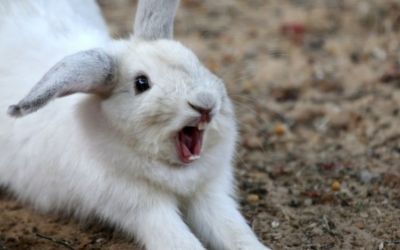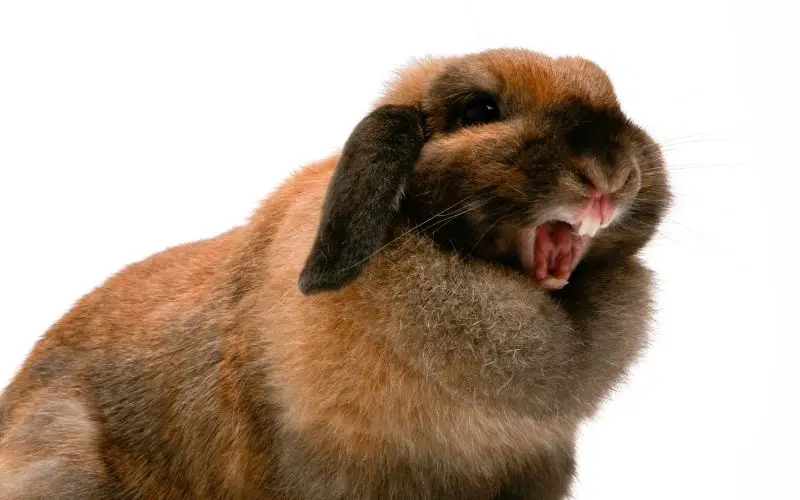I bet most of you consider rabbits to be quiet animals that don’t often make much noise. You couldn’t be further from the truth. Like humans, rabbits communicate through a variety of emotional sounds and body language. And if you focus really hard, you might even be able to understand what it’s trying to tell you.
In this article, I wanted to go over the question of why do rabbits grunt?
When a rabbit grunts, it’s because it feels threatened and wants you to keep your distance. At this point, it could be dangerous to directly interact with your rabbit because it can do anything from push you away to even nip at you if you try to get close. There are many ways to help alleviate this situation.
Jump to...
Why is my rabbit grunting?
Rabbits are incredibly intelligent creatures. They use their vocals to express their feelings and create these rabbit noise in a lot of situations. In fact, there’s a whole group of people studying and categorizing the many sounds that rabbits make.
There can be a multitude of reasons why your rabbit is grunting. Rabbit behavior is interesting. I’ve found that a lot of messages your rabbit is trying to portray to you may vary if it’s combined with other sounds. Below is a list of all the possible reasons why a rabbit might grunt.
Rabbits grunt when they are angry
For a rabbit owner, this is probably going to be one of the most common reasons why rabbits grunt. And this distinct sound is really easy to identity. Grunting is one of these peculiar sounds and it’s sometimes what you’ll hear from a rabbit when it’s angry.

Now, rabbits can be angry for several reasons. They could be hungry. They could be scared or threatened. And they can even feel uncomfortable with you moving its things around.
Grunting may perhaps be one of the more popular sounds you will hear from a rabbit if it’s trying to communicate with you.
As the rabbit becomes even more upset, its actions may even escalate into scratching and biting. It’s important to get to the bottom of every grunting situation so that you can relieve your rabbit from the stress. In any case, I recommend paying close attention to your rabbit and try to understand why it’s angry.
Rabbits grunt when they feel threatened
When a rabbit feels threatened or scared, it will grunt out loud. One instance where you may really hear this is when you are really close to your rabbit for the first time.
If you were to go to a pet store and decide to adopt a rabbit, your first few days with this rabbit as a stranger would probably be filled with grunting.
Remember, rabbits are prey animals, so in an unfamiliar situation (especially if they are held by someone they don’t know), this could be a sign that they feel scared and want to get away. On the other hand, your rabbit might just be grumbling because it wants to go back into its cage.
It takes time to develop a relationship with your rabbit. Always keep your hands open and pet your rabbit from behind the cage as much as possible in preparations to hold it. The process of gaining a rabbit’s trust is similar to that of gaining the trust of a human. You have to take it slow and prove that you are not a threat.
Rabbits grunt when they feel territorial
The other time when you will often hear a rabbit grunt is when it feels threatened or scared about being in a certain place. This may be because the rabbit doesn’t like its home or cage, porcelain surfaces, or even its food bowl.
Or it might not like that someone’s close by or taking up his space. You could’ve even introduced a new rabbit friend and this could also make your rabbit grunt. Again, rabbits are wild creatures and naturally, they can be territorial. In fact, they can mark objects around them with their scent to show ownership. And if you happen to take their things away, you might actually hear a grunt or two.
Another situation where you might hear a grunting sound from your rabbit is when it’s eating. Many rabbits grunt at other animals that crowd over too close to them, but this behavior can also manifest when they are eating.
Grunting while performing the mating ritual
Here’s an outlier to the whole grunting is a negative behavior among rabbits.
It appears that grunting is witnessed to be used during a rabbit’s formal mating ritual. So it can be said that grunting can be a sign of sexual desire as well. Rabbits have been shown to use a combination of honking along with grunting while performing the mating ritual with their significant others.
These signs bear with it the action of circling as well. Circling is one of the main parts in a rabbit’s courting behavior.
Lessen the grunts by getting your rabbit neutered or spayed
There are a few reasons why you would want your rabbits spayed or neutered. The first one would obviously be to stop them from making more babies. More babies would create a much higher need for care and if you can’t provide that type of care, you might have to find some way to give them away.
But rabbits are creatures of habit. The second reason might be equally as good. Spaying and neutering your pets helps alter their aggressive behaviors. This process eliminates the female and males sex hormones which not only prevents more babies but also calms your rabbits down.
You’ll less likely see grunting if your pets are spayed or neutered. You’ll have a rabbit that’s less likely to bite and nip, more likely to make friends, and a more loving pet.
How to stop your rabbit from grunting
It’s hard to imagine a rabbit displaying its anger, but often times it surprises people who aren’t familiar with the scene. Rabbits can get angry and they can nip at your hands, chase you around, and bite your leg in many extreme cases.
While this does happen, it isn’t common. A huge majority of rabbits are nice, loving, and calm.
Pet your rabbit regularly
Petting your rabbit on a set frequent (almost daily) schedule may help you bond with it more. Think of it as you coaxing a wild animal into your home. Don’t scare it away, but slowly introduce yourself to the creature as well as your schedule so it knows what to expect. You want to create a relationship with your rabbit. Make it know that you are a a safe person and someone your rabbit can look up to when he or she’s scared. The bond you build up with your rabbit today, may very well help you deal with it’s emotional behaviors tomorrow.
Get your rabbit spayed and neutered
Just like it was explained above, getting your rabbit spayed or neutered will help lower the potential aggression and biting tendencies. The sex hormones in both males and females can cause these tendencies and can really mess with their emotional state.
Don’t hit your rabbit
Don’t ever hit your rabbit if it does something wrong. Even if it bits you, hitting your rabbit will only make things worst and your rabbit will likely become even more aggressive. Not only that, but rabbits have really good memories and it might even remember what you did to it for a long time.
If you do hit your rabbit, just know that it’s highly possible that your relationship with your rabbit may be destroyed.
I know it sounds counterintuitive but your rabbit doesn’t see you as a master, it sees you as a companion; a friend. Your rabbit might have a “nip” mentality, but it doesn’t mean you’re the bad guy. Remember, the most common reason why your rabbit nipped at you is because your rabbit is scared. It’s emotional state is off and it needs your help to calm down.
Spend time with your rabbit and try to understand it’s needs
Rabbits definitely have reasons for things they do. It’s unfortunate that they just can’t easily express it to you since they don’t talk. Or at least, it’s hard for humans to understand rabbits because we don’t speak rabbit.
I’ve written an article, not too long ago about all the possible sounds and body languages a rabbit could make. If you’re interested check out the link to the article here titled “Rabbit Language: How to Tell What Your Rabbit is Trying to Say.“
If you get to know your rabbit, and understand what it is that’s bothering him or her, you’ll likely share this bond that gives you access into understanding exactly what it is your bunny needs.
Immediately give your rabbit your undivided attention
When your rabbit grunts, its best to immediately drop what you’re doing and going over to assess the issue. Pet your rabbit if you can and assure him or her that you are here and he or she is safe around you.
Offer your rabbit a treat or place it on you lap while continuously petting it. Try to calm and sooth your rabbit as much as possible. Your rabbit is like a crying new born.
Your rabbit might be in pain
Here’s another situation where you might not know why your rabbit is grunting. Grunting is also contributed to a signs of pain. Pain is hard to decipher. But some of the most common signs to pain that come along with grunting is the following.
- teeth grinding
- Rapid and shallow breathing
- Hunched posture
- Reluctance to move
- Bulging and straining
- Shaking
- Eyes not focusing
It’s often recommended that if you find any of these issues, it can be due to something really serious. Your rabbit may require medical attention. Schedule an appointment with the vet as soon as you can. If you’re rabbit’s in pain, you’ll need an expert diagnosis to see exactly what the cause is and how to treat it immediately.
The bottom line
When I first owned my pet rabbit, I didn’t really know why I’d occasionally hear them grunt. It took long ours of research to find out everything I know today.
Owning a rabbit is like having a baby. Sometimes you’ll really not know what they want. Rabbits will make sounds that you’ve never really heard before. It’s your job to decipher exactly what they mean. And with time, you’ll learn to understand your rabbit friend on a whole other level.
If you want to understand more about rabbit aggression, I recommend visiting the Rabbit.org. They have a fantastic article about rabbit aggression here.
Hopefully, this list has been helpful.
Other interesting articles:
